Jessica Cejnar Andrews / Monday, Jan. 22, 2024 @ 4 p.m. / Elections
Assembly Candidates Opine on Housing, Mental Health, Offshore Wind, Electricity Redundancy at Democrats' Invitation-Only Forum
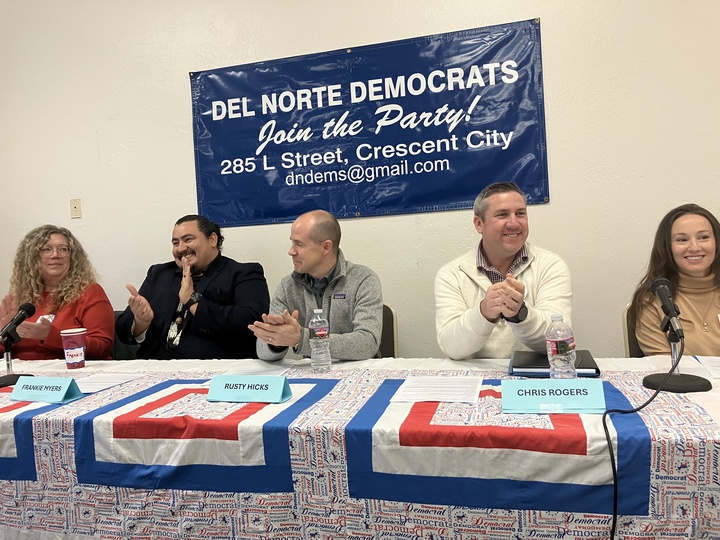
From left to right: Cynthia Click, Frankie Myers, Rusty Hicks, Chris Rogers, Ariel Kelley. | Jessica C. Andrews
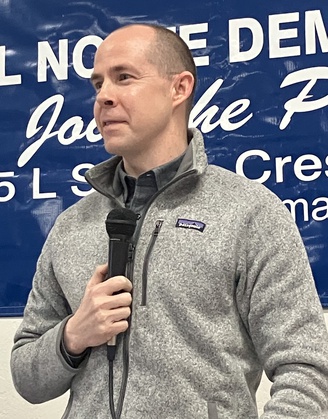
Rusty Hicks
With just 43 days left until the March 5 primary, five out of the six Democratic candidates in the race for California’s 2nd Assembly District introduced themselves to Del Norters on Sunday.
At a forum hosted by the Del Norte County Democratic Party, contenders Cynthia Click, Frankie Myers, Rusty Hicks, Chris Rogers and Ariel Kelley were given 10 minutes to speak.
During those 10 minutes they introduced themselves, opined on housing, offshore wind power, education and mental health services. The hosts asked candidates to give their take on how best to “counteract the MAGA effect.”
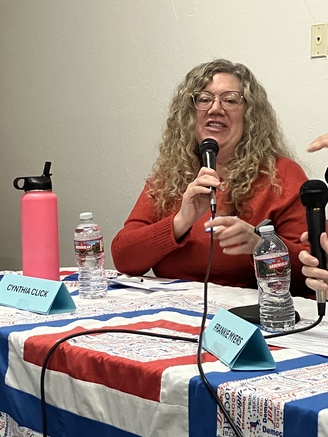
Cynthia Click
Candidates also fielded questions from the audience on topics ranging from the minimum wage increase to electricity redundancy, a particular concern in the wake of the Smith River Complex wildfires.
With limited space, forum attendance was by invitation only, according to Democratic Central Committee Chair Kevin Hendrick.
Mendocino County Supervisor Ted Williams, who was sick with the flu, was absent. Michael Greer, the only Republican candidate looking to fill outgoing assemblyman Jim Wood’s seat, was not invited to participate as the event was for Democrats only, according to Hendrick.
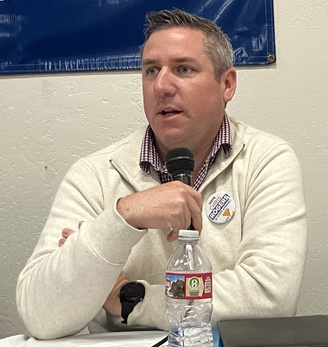
Chris Rogers
Introductions
The first to speak was Click, a sales manager and Willits resident who worked as station manager for Garberville-based community radio station KMUD for about 15 years. Click has lived in Mendocino and Humboldt counties for about 30 years, has never worked in government or politics and says she wants an assembly member who shares her progressive values.
“I’m here to be the representative that I would like to vote for,” she said.
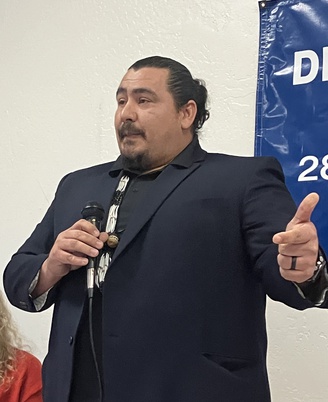
Frankie Myers
When introducing herself, Kelley focused on her experience in politics and local government, particularly as Healdsburg mayor since 2020. Kelley is a land-use attorney who grew up on the banks of Oregon’s McKenzie River and who gained inspiration from the work her parents did to form the McKenzie River Trust.
Kelley cut her teeth in local government working for the city and county of San Francisco and, after moving to Sonoma County, founded the nonprofit Corazon Healdsburg in the wake of the 2017 Tubbs Fire. She said she was on the Sonoma County Planning Commission when another wildfire broke out in 2019. Corazon Healdsburg was able to evacuate 10,000 low-income farm workers as well as seniors during that wildfire.
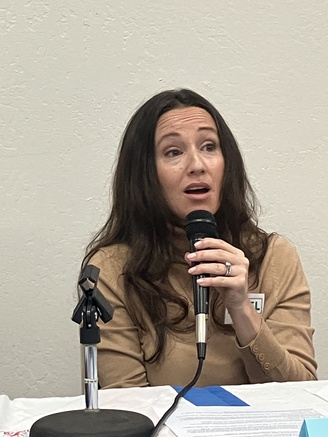
Ariel Kelley
“The work of local government, to me, there is no more important work that is happening in our communities,” she said. “People who are volunteer commissioners [and] volunteer council members, that is really where the rubber meets the road. In my work as a councilmember, our partnerships with our state senator and our state assembly member are critically important to bring the resources of the fourth largest economy in the world … to communities like Crescent City and Del Norte County.”
Rogers, who’s currently a Santa Rosa City Councilor, said he also drew inspiration from his mother’s founding a nonprofit organization, the Early Learning Institute. Like Kelley, Rogers helped his community weather the Tubbs Fire, saying that as a new city councilor his goal was removing barriers toward getting people home.
Rogers said he’s received endorsements from State Sen. Mike McGuire, Congressman Mike Thompson and the Sierra Club. As former staff member in McGuire’s office, Rogers said he visited Del Norte County in 2014 and realized that “one size fits all” doesn’t work for the North Coast.
“We were talking in 2014 about how drought regulations coming out of the governor’s office apply to Del Norte County when Del Norte is not in a drought,” Rogers said. “Public policy only works if it’s not made in a vacuum and if it has input from the people who are being impacted.”
Currently the chairman of the California Democratic Party, Hicks said he’s the first “rural chair” and probably the first chairman to visit Del Norte County in recent memory. He said he’s currently an associate professor with College of the Redwoods teaching American government to Pelican Bay State Prison inmates.
Hicks said he was raised by a single-mother who struggled to make ends meet and graduated from college about a year after he did. He is a veteran of the United States Navy Reserve and was deployed to Afghanistan in 2012 and 2013. Hicks is also a union leader and says he’s focusing on raising the minimum wage for more than 1 million workers and build affordable housing.
“My work has been one of service. The opportunity to run for the Second Assembly District is a continuation of that service,” he said. “We’re at a moment in our history where we need a battle-tested leader with a proven record of delivering real results for working people.”
After greeting voters in his language, Myers, vice chairman of the Yurok Tribal Council, thanked the Tolowa people for allowing the forum to be held on their land. Myers was born and raised on the Yurok reservation, grew up in a traditional home without electricity, TV or phones about 100 yards from his grandparent’s house.
Myers said his parents showed him what it means to be hardworking, while his grandparents taught him to live in balance with one another and take care of one another. But, he said, when his grandmother was born she didn’t have the right to vote and when his father was born, he didn’t have the right to prayer.
Myers said he has both those things, and that’s why he’s running for Assembly.
“I get asked from time to time, ‘Why are you running for office?’” Myers said, adding that in 140 years there's only been one Native American who has held a state office. “I think it’s a question we all get. And I’ve had a lot of time to think about it and I have a very simple answer: Because I can. For my community and for my family, that hasn’t always been true.”
Housing & Mental Health
Answering a question that mentions Del Norte County’s “acute shortage of affordable housing” as well as a lack of supportive housing and behavioral health services, Myers mentioned the swamps, a marshy area south of Crescent City that houses several homeless encampments.
In addition to low-income housing, affordable housing for all is needed, Myers said.
According to Myers, as legislators it’s important to support local entrepreneurs and to tap into local, state and federal resources. This, he said, is something the Yurok Tribe has done, bringing more than $50 million in housing to the Second Assembly District.
Myers also said it’s important to be environmentally conscious while working to streamline the process of establishing affordable housing.
“It’s one of the core beliefs systems as Yurok people, that humans belong here on this planet,” he said. “We’re supposed to be here. And as we build housing and we address both those issues, we need to ensure we’re bringing all of our resources to the table.”
As part of the question regarding mental health, the local Democratic party asked candidates to weigh in on Proposition 1. Slated to appear on California’s primary ballot, the measure proposes to issue $6.68 billion in bonds to house homeless individuals and veterans and to expand mental health care and drug and alcohol treatment.
Rogers, however, said that while he’s a proponent of universal healthcare, the proposition is a Band-aid on a broken system.
Everyone needs access to mental health care, but it’s important to decouple people’s employment from healthcare, Rogers said.
“We need to make sure that investments in our health system aren’t being driven by profit from private businesses, but rather looking collectively at the needs of the entire region,” he said. “That means investments in rural communities as well.”
Hicks noted that Del Norte County needs “every type of housing possible” from low-income to market-rate to workforce housing.
Like Myers, Hicks said that Sacramento can streamline the process.
But while Hicks supports Prop 1, which brings “housing and support services together,” he said the state needs to maximize the availability of those services to those who take part in state healthcare programs.
“We’re one of 15 states in the country that do not allow same-day billing,” he said. “So if I go in for primary care and the provider says you need mental health services, the clinic cannot bill for those two visits. We say come back tomorrow. Call this number. Make an appointment. Well, good luck. Someone who took off a day of work to get care is probably not going to come back for those mental [health] services. Those are the kinds of things I think we as a state have to certainly fix.”
Click said that the missing link in the question regarding mental health is first responders. She also called for a middle ground for folks who can be assessed and get their needs met without winding up in the jail system.
When addressing affordable housing, Click mentioned low-income housing tax credits. She also touched on the Regional Housing Needs Assessment, which outlines how many units a city or county needs to provide developable land for. However, she said, those tax credits go to large investors rather than small developers whose projects may be a better fit for communities like Del Norte County.
“I think that our local governments can really understand how to better address the housing needs of our communities and they should be responsible for allocating these tax credits,” Click said. “It would make the application process a bit easier for local developers that could invest in their own communities and we could build the housing we need in our areas.”
According to Kelley, one of her favorite jobs as Healdsburg mayor in the past year has been handing people the keys to their first home. One new resident was a mother who lost her home after one of the fires.
“She said her kids were so happy to have a bathtub for the first time in their lives that they call it the swimming pool,” Kelley said.
During Kelley’s tenure as Healdsburg mayor that community has established more housing units than at any other time in the last two decades. This includes establishing its first-ever homeless shelter using $7 million in local grants, Kelley said.
Kelley said she supported Proposition 1 because unless wraparound services like drug rehabilitation and mental health treatment are included, the homelessness and housing crises can’t be solved.
“Many of these folks in the room, I know, work in healthcare careers. You’re seeing people coming into a hospital setting or in a clinical setting and they’re not able to get the treatment they need because they’re going right back out on the street,” she said. “I’m really excited to have Proposition 1 and have additional resources in our local communities to help solve and get those housing units for veterans and for people who need it most.”
Offshore Wind
Kelley and every other candidate speaking on Sunday acknowledged a balancing act between the importance of clean energy and the need to preserve the commercial fishing industry.
“I want us to be very eyes-wide-open about bringing the environmental community to the table,” she said. “Bringing our fisher folks, I don’t want to say fishermen because there’s women out there, bring them to the table and making sure that we have those really important conversations now.”
Click said she was wary about the offshore wind energy development being planned for off the North Coast. She’s nervous about how they will impact local fisheries as well as whale migration patterns. But she acknowledged that it’s hard to ignore climate change.
Click said she supported offshore wind energy development locally, noting that Cal Poly Humboldt can provide the educational resources to prepare people for jobs in that field. She also noted that California’s environmental laws are some of the strongest. However, she said, she doesn’t want local communities to be “left with a mess again.”
“I’d like to see forward-looking planning because these airplane-size blades are only good for like 15-20 years,” Click said. “Most of the components can be recycled. There are some companies working on some recycling efforts. I’d like to see a forward-looking plan on what we’re going to do with that waste because I don’t want to see acres and acres of dead windmills out there.”
Rogers applied the “one-size-fits-all” phrase to wind power promising that that won’t be the way he approaches offshore wind energy development in his district. But, while he said he’s met fishermen who are concerned about wind energy’s impacts on the local industry, to him that concern speaks to a lack of diversification in the economy.
“That’s where the state needs to step in and help to build that economic engine in places like Crescent City and Del Norte County,” he said. “We know if you look at the duck curve, which is the state’s daily output on clean energy, that we need more wind power and more geothermal power, otherwise we’re going to continue to rely on inadequate infrastructure.”
Hicks said offshore wind energy production off the North Coast is one way to reduce California’s reliance on fossil fuels. But there are still technical questions around how to make it work.
“How do you float a turbine that’s the height of the Eiffel Tower and as big as a city block 20 miles out into the ocean to provide the power that we need,” Hicks asked. “Secondly, how do we do it in an environmentally sustainable way?”
Engagement at the local level is needed to make offshore wind energy work, Hicks said. This includes engaging with local workers, tribal partners and “grassroots activists” who need to be part of the entire process.
“I think that ongoing community engagement is going to be incredibly important,” he said.
Myers said the Yurok Tribe has been pushing for a “measured approach to renewable energy” focusing on sustainability. He called for using resources from tribal partners and federal funding and to “push out” corporate sponsorship to ensure profits aren’t the sole focus of offshore wind energy development.
He noted there are billions of dollars being invested in clean energy and that taking the approach of “progress for progress’s sake” has horrific consequences.
“We shouldn’t take that approach toward any development, renewable or not,” he said.
Electricity redundancy
Hendrick prefaced this question by telling candidates how the Smith River Complex wildfires affected the transmission lines bringing electricity to Del Norte County.
“Many of us realized at that point, that we have no redundancy of our power supply,” Hendrick said. “I don’t know of any other place in California that can brag about that.”
Forced to de-energize its transmission lines due to the wildfire, Pacific Power electrified Del Norte County by plugging large generators into their substations.
On Sunday, Hendrick asked candidates what connections they had in Humboldt and possibly Curry counties they had to ensure that Del Norte wouldn’t be left in the dark should another wildfire threaten power lines.
Rogers also pointed out that along with electricity, many Del Norters didn’t have access to their water as well.
“The good news is you don’t have PG&E as your utility provider,” he joked.
Rogers argued for removing a provision in California’s utility code that requires new housing development to be able to tap into a power grid. Removing that requirements creates a local source of energy that builds resiliency, Rogers said.
“It also has the benefit of reducing the cost of building that housing development,” he said. “We have seen across California, utility providers saying stop building housing, stop building because they can’t energize it. If you build the infrastructure, make it be local.”
Myers, who is a member of the Redwood Coast Energy Authority board, also argued that more local control around the electric grid would help communities become more energy independent. The federal government would be a good partner, Myers said.
Myers also referred to the Yurok Tribe Telecommunications Corporation’s $61 million Tribal Broadband Connectivity Program grant that will install 62 miles of middle mile fiber optic cable from Orick to Crescent City.
“I think you [should] take that same approach for the electrical grid as well,” Myers said.
Click said she loved the idea of micro-grids, but Del Norte’s experience during the Smith River Complex should be part of a wider conversation surrounding emergency preparedness. She mentioned Covelo and a road closure that cut that Mendocino County community off.
“We need to have emergency plans for the smaller communities and the larger communities as well for what we’re going to do because it’s not really a matter of if, it’s a matter of when,” Click said.
Kelley also argued that redundancy is critical and that Del Norte County isn’t the only community that’s been cut from much-needed utilities during an emergency. She called for incentivizing and increasing access to rooftop solar panels for homeowners and reducing reliance on investor-owned utilities.
Those utilities, Kelley said, don’t think about the end-user or the consumers as much as they think about their shareholders.
“It’s really [about] holding the Public Utilities Commission accountable for the job they’re supposed to be doing to hold the utilities accountable,” Kelley said. “We’re not seeing that work happening in our communities and unfortunately, the redundancies are not there across the board. This is something that’s a huge priority. I think it’s great to raise the question, but we also got a lot of work to do.”
Hicks also cracked a PG&E joke, but said redundancy is needed on a variety of different fronts, not just electricity, especially as natural disasters increase in intensity.
“We can localize a number of these assets and [that] has already been referred to,” he said. “But I do think the work of the state has to be to have a conversation about this in much more of a global holistic way. It can’t just be about one asset or the other, and it’s going to take some state resources to be able to do that.”
Hicks also called for a climate bond, similar to the bond for mental health services and housing that Prop 1 calls for.
“I think a climate bond on the November 2024 ballot is the way in which to address some of these issues,” he said. “Because it allows us to pull down federal money.”
The entire forum will be broadcast on KFUG 101.1 FM at 7 p.m. Tuesday. It will be broadcast again on KFUG at 2 p.m. Sunday.
Ballots will be sent to Del Norte County voters on Feb. 5, according to County Clerk Alissia Northrup. People can also visit the Del Norte County Elections Office to pick up a ballot, Northrup said.
CLICK TO MANAGE